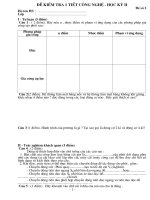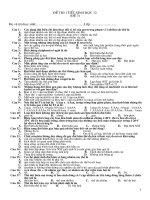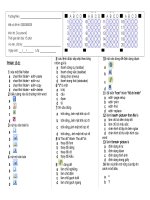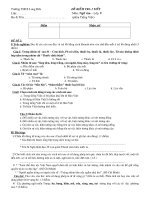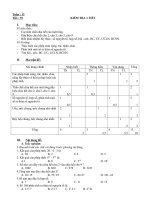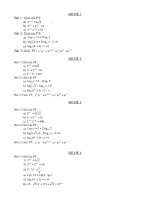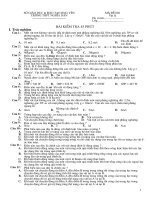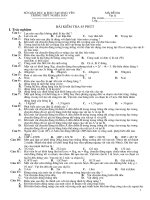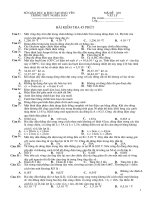kt 1 tiet NC
Bạn đang xem bản rút gọn của tài liệu. Xem và tải ngay bản đầy đủ của tài liệu tại đây (144.32 KB, 7 trang )
Name : ………………………. ONE PERIOD TEST – No 1 ( ADVANCED )
Class : ………………………. Time : 45’
I. Listen to the tape twice. Write True (T) or False (F) in your paper test.(1pts)
1. Christina is a businesswoman.
2. The fire happened three years ago
3. The fire started in the bedroom
4. When the fire started, Christina was reading a book
II. Choose the word or phrase - A, B, C or D - that best completes the sentence or do the task as
directed ( 3 pts ):
5. Choose the incorrect part indicated by A, B , C, D in the following sentence :
He told that he was going to Ho Chi Minh city the next day.
A B C D
6. She often battles …………..her daughter …………..household chores.
A. with / over B. in / over C. to / about D. for / of
7. My sister has been working in this factory ………….. 1990
A. for B. at C. since D. in
8. Tonight we are having a ………….. party.
A. house-warming B. home- warming C. house- coming D. home- coming
9. We would like to ………….. our apologies for the delay to your flight today
A. offer B. make C. come D. enter
10. Which underlined letter(s) has different sound?
A. daughters B. tasks C. kids D. rooms
11. Which underlined letter(s) has different sound?
A. closed B. booked C. watched D. washed
12. Mary : .Thanks for coming. What a nice gift you have brought us !
Tom : …………………………………………….
A. I am sorry B. No, thanks C. It’s nice of you to say so D. All are correct
13. A person's widened eyes may be interpreted ……….. in ………….cultures.
A. differently / different B. different / different
C. differently / differently D. different / differently
14. My sister ………… for you since yesterday.
A. is looking B. was looking C. has been looking D. looked
15. They ……………..table- tennis when their father came back home.
A. played B. was playing C. playing D. were playing
16. A Chinese often shows his ………….. by widening his eyes.
A. anger B. interest C. astonishment D. happiness
5 6 7 8 9 10 11 12 13 14 15 16
III. Complete the sentences with appropriate form of the words in brackets ( 1 pts ) :
1. A: Tom doesn’t do well in his tests, does he ?
B : No , he doesn’t . Maybe because he is a(n) ……………….. boy ( attention )
2. Susan was very ………… of the work she had done ( pride )
T F
3. Some students in my class are starting to learn another language and they find it ………………..
( enjoy)
4. He broke his arm when he ………….. football ( play)
IV. Rewrite the following sentences as directed ( 2 pts ):
1. She asked me , “ Do you know how to get to the town centre ? “
……………………………………………………………………
2. She moved to London two years ago
It is two years since …………………………………………….
3. I haven’t eaten the delicious food like this before
This is the first time …………………………………………..
4. “ Let’s go fishing next Sunday “, said Mary
Mary suggested …………………………………………
V. Complete each of the following sentences using a suitable word or phrase ( 1 pts ):
1. ………was raining hard the children couldn’t get out
2. My son is………………… in reading books
3. She spent the day preparing for her son’s …………….. trip. He had been away for a long time
4. Our parents taught us not to be ……………………. to elderly people
VI. Read the following passage and then answer the questions on it ( 1 pts ) :
Greetings in all languages have the same purpose: to establish contact with another person, to
recognize his or her existence, and to show friendliness. The formulas for greetings are very specific and
usually do not carry any literal meaning. People say “ Good morning “ even if it is a miserable day and
may reply to “ How are you ? “ with “ Fine, thanks “ even if they are not feeling well.
Closings, like greetings, are commonly used exchanges with no literal meaning. People who are
together everyday say goodbye at the end of the day or week (and wish each other a nice weekend)
When leaving a party, guests always find the host or hostess to say thank you and goodbye. People
who are leaving each other permanently or for a long time shake hands or embrace, depending on the
relationship. If you are in unfamiliar situation and wonder what to do, watch other people or ask.
1. What is the purpose of greetings ?
........................................................................................................................................................................
...............................................................................................................................................................
2. If you aren’t feeling well, can you reply to “ How are you ? “ with “ Fine, thanks “ ?
……………………………………………………………………………………………………………
…………………………………………………………………………………………………………..
3. What should guests do when they leave a party ?
……………………………………………………………………………………………………………
…………………………………………………………………………………………………………..
4. What should you do if you are in an unfamiliar situation and don’t know what to do ?
………………………………………………………………………………………………………
………………………………………………………………………………………………………
Name : ………………………. ONE PERIOD TEST – No 1 (ADVANCED)
Class : ………………………. Time: 45’
I. Listen to the tape twice. Write True (T) or False (F) in your paper test.(1pts)
1. Christina is a businessman.
2. The fire happened thirty years ago
3. The fire started in the kitchen
4. When the fire started, Christina was watching TV
II. Choose the word or phrase - A, B, C or D - that best completes the sentence or do the task as
directed ( 3 pts ):
5. The mother was bewildered by her son’s questions
A. puzzled B. conflict C. glare D. divide
6.Which underlined letter(s) has different sound?
A. pressed B. faded C. danced D. knocked
7."This man spoke to me on the road", said the woman.
A. The woman said that man had spoken to me on the road.
B. The woman told that man had spoken to her on the road .
C. The woman said that man spoke to her on the road .
D. The woman said that man had spoken to her on the road .
8. Which underlined letter(s) has different sound?
A. stops B. cuts C. begins D. laughs
9. I ………….. this books three times
A. have read B. has read C. have been reading D. A & C
10. Choose the word A, B, C, D whose main stress is different from that of the others in each group
A. etiquette B. dishonest C. simplify D. indicate
11. The student …………… the teacher for coming so late.
A. apologized to B. thanked C. promised D. suggested
12.Peter: Why didn’t you come to the English speaking club yesterday “
Mary : ……………. I had to take care of my baby sister. My parents were out to the countryside.
A. Thank you B. Pardon me C. Excuse me D. I am terribly sorry
13. Which would you …………., tea or coffee?
A. preference B. prefer C. preferential D. preferentially
14. When it ………. to rain, they ………….. through the forest
A. started / walked B. started / were walking c. started / was walking D. B & C are correct
15.Sit down and …………..
A. away from home B. homemade C. household D. make yourself at home
16.Choose the incorrect part indicated by A, B , C, D in the following sentence :
He asked me not to going to bed late
A B C D
5 6 7 8 9 10 11 12 13 14 15 16
III. Complete the sentences with appropriate form of the words in brackets ( 1 pts ) :
T F
1. Tom felt ……….. because he didn’t receive a letter from his girlfriend ( happiness )
2. Didn’t you notice anything suspicious in his ……………. ( behave )
3. The Japanese often lower their eyes to show ……………….to the superiors ( respectful )
4. In Viet Nam roses …………… love ( symbol )
IV. Rewrite the following sentences as directed ( 2 pts ):
1. The tourist guide said to us : “ Take a map if you go walking in the hills “
The tourist guide advised ………………………………….
2. I haven’t seen Bridget for ages , “ said Michael
Michael said ………………………………………………..
3.It is three years since I last went to the cinema
I haven’t been …………………………………………………..
4. “ Why don’t we go to the cinema ? “
Mary suggested ……………………………………………….
V. Complete each of the following sentences using a suitable word or phrase ( 1 pts ):
1. He was wearing a suit , which was …………………… for an informal gathering.
2. I have …………….. this film for the third time.
3. Every country has its own codes of ………………
4. Many Vietnamese families now own ……………. appliances such as fridges, microwaves, and
cookers .
VI. Read the following passage and then answer the questions on it ( 1 pts ) :
If you are invited to someone’s house in America for dinner, you should bring a gift, such as a
bunch of flowers or a box of chocolates. If you give a host a wrapped gift, he may open it in front of
you. Opening a present in front of the gift-giver is considered polite. It shows that the host is excited
about receiving the gift and wants to show his appreciation to you immediately. Even if the host doesn’t
like it, he will tell a “ white lie “ and say how much they like the gift to prevent the guest from felling
bad.
If your host asks you to arrive at a particular time, you should not arrive exactly on time or earlier
than the expected time, because this is considered to be potentially inconvenient and therefore rude, as
the host may not be ready.
1. What should you bring if you are invited to someone’s house in America for dinner?
……………………………………………………………………………………………………………
……………………………………………………………………………………………………………
2. Is opening a present in front of the gift-giver considered impolite?
……………………………………………………………………………………………………………
……………………………………………………………………………………………………………
3. What will the host do if he doesn’t like the present?
……………………………………………………………………………………………………………
…………………………………………………………………………………………………………..
4. Why shouldn’t you arrive exactly on time if you are invited to a dinner at a particular time ?
........................................................................................................................................................................
...............................................................................................................................................................
In Italy, people and personal relationships are more important than time and schedules, which are
flexible. People may be late for an appointment, although they are more (31)____ in the north of the
country than in the south. To north Europeans their way of working may seem disorganized and
(32)____. In meetings they don't feel they have to follow the agenda or speak only in turn. They
interrrupt (33)____ a lot and often talk at the same time. They are excellent communicators and are very
expressive in their use of body language. Appearance and good manners are important, so you should
dress well and (34)____ polite, but you don't have to be formal. Food is a very important part of life,
and is very good, so remember to compliment them (35)____ their cuisine.
31. A. on time B. in time C. punctual D. punctually
32. A. inefficient B. inefficiently C. efficiently D. efficiency
33. A. another one B. themselves C. yourselves D. each other
34. A. do B. talk C. be D. speak
35. A. on B. with C. for D. at
1. “ Is the weather good ?” , said Richard
Richard wanted to know …………. the weather was good
A. that B. if C. whether D. B & C
2. “ I saw him yesterday “ said Rose
Rose said that she had seen him …………………
A. yesterday B. the day after C. the day before D. that day
3. Choose the word whose underlined part is pronounced differently from that of the other words
a. watched B. hoped C. decided D. washed
4. Many Vietnamese families now own …………. appliances such as fridges, cookers , washing
machines.. .
A. guesthouse B. housewarming C. housework D. household
5. The mother was bewildered by her son’s questions
A. puzzled B. conflict C. glare D. divide
6. Choose the incorrect part indicated by A, B , C, D in the following sentence :
He invited me to having dinner with him and his family
A B C D
7. They wanted to know how long………………. in England
A. would you stay B. you will stay C. you stay D. you would stay
8.He has been there ....................
A. next week B. already C. yesterday D. tomorrow
9.Choose the word A, B, C, D whose main stress is different from that of the others in each group
A. etiquette B. dishonest C. simplify D. indicate
